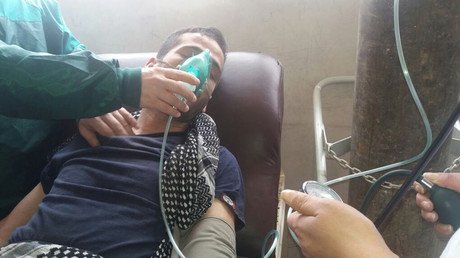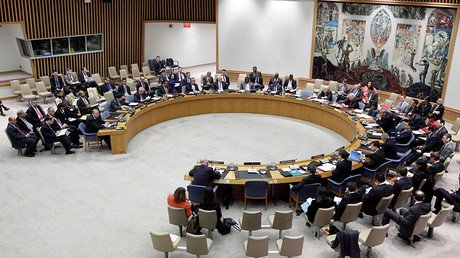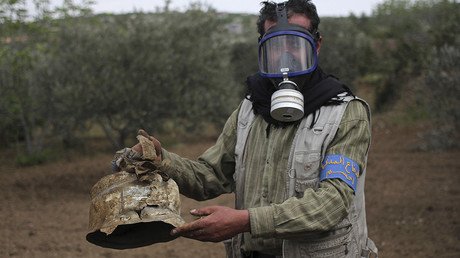Syrian Islamist group Jaysh al-Islam admits using banned weapons against Kurds in Aleppo
The Jaysh al-Islam militant group fighting government forces in Syria has admitted to using “forbidden” weapons against Kurdish militia in Aleppo. The group’s statement comes after reports of chemical gas being used in shelling Aleppo’s Sheikh Maqsood district.
The hardline Islamist group did not not specify what substances were used, but claimed that it will punish those responsible.
The group’s statement reads: “During the clashes one of the Jaysh al-Islam brigade leaders used [weapons] forbidden in this kind of confrontations.”
The group claims that the brigade commander in question was summoned to a military court, where it was decided he is to be held accountable. “This situation is contrary to the charter of Jaysh al-Islam,” says the group.
Aleppo’s Sheikh Maqsood neighborhood was shelled with mortars containing chemical agents earlier on Thursday.
READ MORE: Aleppo district shelled with chemical gas – local journalist to RT
The Kurdish Red Crescent confirmed reports that chemicals had been used in the attack. “The symptoms of those affected by the attack such as choking made it possible to affirm that they were poisoned as a result of the use of banned toxic gases such as chlorine or other agents. All our patients have similar symptoms,” Doctor Wallat Mamu told RT.
YPG also confirmed that toxic agents had been used by the Islamists, according to RIA Novosti.
“We confirm the information concerning usage by Islamists, acting under patronage of Turkey, of the poisonous agent in the Maqsood neighborhood of Aleppo. Its poisonous effect have experienced dozens of civilians,” the head of the YPG central headquarters was cited as saying.
READ MORE: ISIS launches chemical weapons attack on Syria’s airbase in Deir Ez-zor – report
YPG intends to report the incident to the Jordan-based US coordination center and the Russian Center for reconciliation of the opposing sides in Syria, which oversee the cessation of hostilities.
“We will report this fact to the ceasefire centers, to the Russian center in Latakia and to the American one in Jordan,” YPG said in a statement.
The hardline Islamist group Jaysh al-Islam is formally a member of the High Negotiations Committee (HNC) that is representing the Syrian opposition at the Geneva talks.
Both Russia and Syria have repeatedly demanded the exclusion of Mohammed Alloush, previously known as Jaysh al-Islam’s political leader, from the negotiations process.
Alloush was picked as the chief negotiator for the Syrian opposition in Geneva, which has drawn ire from Damascus and criticism from Moscow.
Russian foreign minister Sergey Lavrov told a press conference in January that Russia would not change its view of the “terrorist essence of Jaysh al-Islam,” which is “known to have shelled residential districts in Damascus, including the Russian Embassy.”
In March, Russian Deputy Foreign Minister Gennady Gatilov reiterated Russia’s stance that Jaysh al-Islam is a terrorist organization.
“From the very beginning, Russia opposed inclusion of the representatives [of Jaysh al-Islam] in the opposition delegation… They take part in the delegation only in a purely personal capacity… We will only welcome their exclusion from participation in the negotiations,” he told RIA Novosti.
44 civilians killed, 74 injured in Aleppo attacks in 2 weeks – Russian MOD
Meanwhile, the Russian Defense Ministry has reported observing a rise in terrorist attacks in the Aleppo area over the past two weeks, which it said had killed and injured dozens of people.
“In [the] past two weeks, the number and the scale of terrorist provocations in Aleppo have grown significantly – 44 civilians have been killed and 74, including children, have been wounded as a result of these attacks,” said the ministry’s spokesman, Igor Konashenkov.
Official YPG spokesman Redur Xelil told RT that Turkey has contributed greatly to the disruption of the ceasefire in Aleppo by backing militant groups fighting against the Kurds in Syria.
“Here in Sheikh Maqsood, and in Aleppo, there is no cessation of hostilities. The ceasefire has not brought any peace for the YPG and the Kurdish people. In fact it’s the opposite – the attacks on us have intensified. We are absolutely sure that it’s the Turkish government and the rebel groups they support that are responsible for these assaults,” said Xelil.
The ceasefire in Syria came into effect on February 27. The cessation of hostilities agreement, drawn up with the active involvement of US and Russian diplomats, includes some 97 militant opposition groups operating in Syria. Terrorist organizations, such as Islamic State (IS, ISIS/ISIL) and Al Nusra Front, were excluded from the deal.
Numerous violations of the ceasefire have been reported since its implementation. Last month, Sergey Kuralenko, head of the Russian Center for reconciliation of the opposing sides in Syria, confirmed 250 cases of the ceasefire being breached.
















